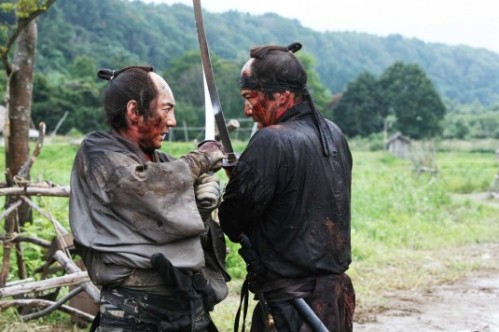There is a double sadness in 13 Assassins, the latest film from Japanese director Takashi Miike. The group of warriors have a suicide mission against an army of hundreds; that is the first tragedy. The second is the nostalgia for the Golden Age of samurai pictures in the 1950s and 60s, a genre defined by directors like Akira Kurosawa and Hiroshi Inagaki. Ironically, these films were all about the decay of the samurai tradition, set in Japan on the verge of industrialization. The leaderless ronin were lonely wanderers, often picking up a cause and seeing it through with their lives. It is no wonder that John Sturges chose Seven Samurai as a base for his remake The Magnificent Seven; Westerns and Japanese swordplay films share a lot of the same mythological background.
Miike is clearly on the warpath to bring back those early days. He blocks his characters precisely against painted panels and candle light. Ozu is hailed with every 3-feet-above-the-ground shot. The free gravity fighting popularized by Woo-ping Yuen (The Matrix)and hectic action editing of Tony Scott is shunned for more visceral combat captured in longer takes. Also nostalgic is the simple story of a ‘Dirty Dozen’ crew called upon the brass to rid the kingdom of a sadistic and destabilizing noble.
The psychopath in question is Lord Naritsugu (Gorô Inagaki), adopted son of the Shogun (military dictator) who rapes and mutilates for pleasure. When it comes to violence Miike is a big believer of showing and not telling. An entire family pin-cushioned by arrows and a limbless but living victim are some of the earlier shocks in a first act dominated by sliding doors and political game-talking in the Shogun Council. Its leader, Sir Doi (Mikijiro Hira), enlists Shinzaemon (Kôji Yakusho) to assassinate Naritsugu as he travels to receive his promotion to first advisor.
Shinzaemon’s hands quiver when he hears his call; he calls it “battle shakes”. Miike takes his time building the tension as the 12 assassins gather and make their plans. This all stock adventure movie plotting, but somehow it feels fresh and taut under Yakusho’s stoic leadership. Lucky number thirteen is picked up along the way, and provides much of the comic relief. Yûsuke Iseya prances in rags as the hunter Koyata, a throwback to Toshiro Mifune’s jungle wanderer from Rashomon. You know you’re being guided by an expert director when the pacing is sublime. Miike is supremely, almost arrogantly, confident as he guides the ronin through the wilderness and to the lodging town where they make a stand. His experience is pretty amazing: 50 films in the last 20 years, the Japanese equivalent of Woody Allen.
All this pays off big time in the third act, perhaps the longest extended battle scene ever committed to screen. Over-extended is maybe a better word. The endless slaughter sucks the energy out of the final confrontation, one between Shinzaemon and Naritsugu’s captain, the honourable Henbai (Masachika Ichimura). Nevertheless it’s great fun to see the assassins rip apart the lord’s troops, first by Indiana Jones-style booby traps. The town becomes a labyrinth of death controlled by the ronin from the rooftops. The old school feel is briefly wrecked by some third-rate CGI bulls the samurai unleash in the town’s narrow aisles.
Finally the samurai descend from the roofs and unsheathe their katanas, an adrenaline rising moment if their ever was one. The political smoke and mirrors of the opening turn into mud, blood, smoke and fire. Crimson rains down from the sky during brutal melee combat, quiet unlike Donnie Yen’s acrobatic in Legend of the Fist. This is definitely the most violent film I have seen at this year’s TIFF so far, and the most entertaining. Spurting out as thick as the blood are the battle come-ons, including assassin Kuranaga (Hiroki Matsukata) declaring “we shall commemorate your way with arrows” before firing a volley into the trapped soldiers below.
All samurai films are essentially tragedies, and the sadness I mentioned before is clear from the beginning when Shinzaemon says “I might be remembered, when all this is over, after I die”. Honour runs deep in these men’s veins. Another assassin declares “ours is not to reason why, just to obey and die”. The Tennyson reference is another antiquarian touch to a very old-fashioned movie. Noble thirteen, and noble effort. The samurai film just rode out of the valley of death.
13 Assassins played Tuesday September 14th at Ryerson Theatre. It also plays September 16th and 19th. TIFF link.

